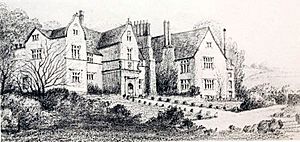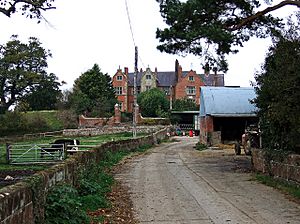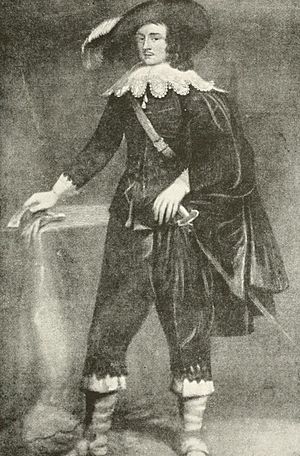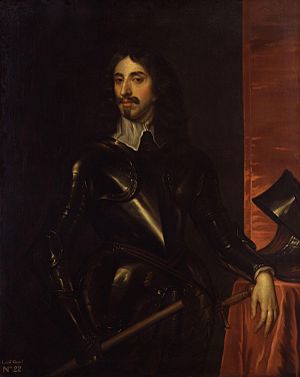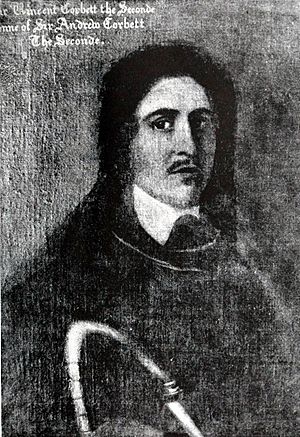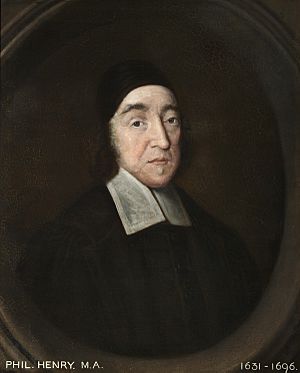Robert Corbet (died 1676) facts for kids
Robert Corbet (died April 1676) was an English politician who supported the Parliament during the English Civil War. He was part of the committee in Shropshire that worked to fight against the King's supporters, known as Royalists. He also represented Shropshire in the First Protectorate Parliament. Robert Corbet is well-known because he employed and guided Richard Gough, who wrote an important book called Antiquities and Memoirs of the Parish of Myddle. This book, which is about local life and people, mentions Robert Corbet many times.
Contents
Robert Corbet's Early Life and Family
Robert Corbet came from a family of important landowners, called the landed gentry, in Shropshire. In the 16th century, Shropshire didn't have many very rich noble families, but this slowly changed. Both of Robert's parents, Thomas Corbet and Margaret Corbet, were related and belonged to the powerful Corbet family.
- Thomas Corbet lived at Stanwardine Hall, near Baschurch, Shropshire. His father, also named Robert Corbet, started this branch of the family. Thomas Corbet died in 1615.
- Margaret Corbet was the daughter of Sir Vincent Corbet of Moreton Corbet. Her brother, Sir Andrew Corbet, was also a well-known Member of Parliament (MP) for Shropshire. The Moreton Corbet branch of the family was very influential, but they had faced money problems for a while.
We don't know exactly when Robert Corbet was born, but it was likely in the early 1600s. Richard Gough said that Robert Corbet was a "Master in Chancery," which means he was a senior lawyer who worked in London. This suggests he had a lot of legal training and experience.
Family Connections
Robert Corbet was connected to other important Corbet family members in Shropshire, especially during the Civil War. His uncle, Sir Andrew Corbet, was an MP who disagreed with King Charles I's policies. His cousin, Sir Vincent Corbet, 1st Baronet, was a Royalist cavalry leader. Another cousin, Sir John Corbet, was a Puritan and supported Parliament.
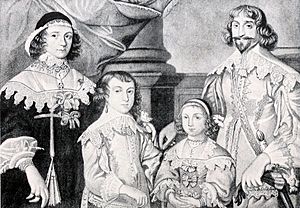
Robert Corbet's Political Life
Important Roles
Robert Corbet held several important positions. In 1636, he was the High Sheriff of Shropshire. This was during a time when King Charles I ruled without Parliament, and sheriffs had to collect special taxes like "ship money." At this time, Robert Corbet wasn't known as an opponent of the King, as the King's government appointed sheriffs. This also shows that Robert Corbet was living in Shropshire by then.
Richard Gough also said that Corbet was a Justice of Peace (JP) and a "Master in Chancery." As a JP, he was often present at court sessions, especially during the time when England was without a king (the Interregnum).
The English Civil War
When the Civil War began, the town of Shrewsbury and the county of Shropshire were taken over by the Royalists. King Charles I moved his army to Shrewsbury and occupied it in September 1642. After the King left, the town was guarded by Royalist soldiers, led by Sir Francis Ottley. The King and Ottley made lists of people who supported Parliament or were Puritans, declaring them outlaws. Robert Corbet's name was on one of these lists in 1643, accused of speaking against the King. However, he was released on bail by two important men. By this time, he was already a member of Shropshire's Parliamentarian committee, which was formed in February 1643.
This committee was made up of people like Sir John Corbet and Richard More, who had long opposed the King. Robert Corbet, Thomas Hunt, Thomas Mytton, Humphrey Mackworth, and Andrew Lloyd were also part of it. The committee struggled to gain control in Shropshire at first. However, some members, including Mytton, Mackworth, and Hunt, decided to act on their own. They set up a small army base in the town of Wem around August. In October, they bravely defended Wem against a strong attack by Royalist troops led by Lord Capel. The people of Wem, including the women, helped defend the town, leading to a famous rhyme:
- The women of Wem, and a few musketeers,
Beat the Lord Capel, and all his Cavaliers.
Robert Corbet moved to Wem and stayed there for most of the fighting. In December, he and Lloyd wrote to Mackworth, asking him to tell Parliament about their difficult situation, as they had risked everything for the cause. In January 1644, Parliamentarian forces helped Wem, and Mytton defeated a Royalist group.
In March, Prince Rupert of the Rhine arrived in Shropshire to help the Royalists. This led to a famous story told by Richard Gough, involving one of Robert Corbet's employees. Parliament had ordered that captured Irish soldiers be hanged, and 13 were executed. Later, some Parliamentarian soldiers were captured by Rupert's men.
- The next day the Prince ordered thirteen of these prisoners to be hanged. They rolled dice on a drum to decide who would die. Among them was Phillip Litleton, who used to work for my old master, Robert Corbet of Stanwardine. Phillip saw Sir Vincent Corbet ride by and said, "If Sir Vincent Corbet knew I was here, he would save my life." A kind soldier rode after Sir Vincent and told him. Sir Vincent immediately came back, got off his horse, and knelt before the Prince, begging for Phillip's life. The Prince agreed, on the condition that Phillip would never fight against the King again. Phillip promised and escaped, and after that, no more Irish soldiers were hanged.
Prince Rupert's army left Shropshire to help at the Battle of Marston Moor in July 1644, where they were defeated. However, he returned to the West Midlands. Divisions began to appear on both sides. The Shropshire Parliamentarian committee also started to have disagreements. They secretly planned to take Shrewsbury, where many people were unhappy with the Royalist rule. They finally captured Shrewsbury in February 1645.
After Shrewsbury fell, the Shropshire Parliamentarian committee could finally set up its headquarters there. They became like a town council, and Mackworth was chosen as governor, even though Mytton was a local man. Corbet seemed to be a supporter of Mackworth, and they worked together until Mackworth's death in December 1654.
Puritan Beliefs
After Parliament won the First English Civil War, much of Robert Corbet's public life involved setting up a Presbyterian church system in Shropshire and keeping public order as a justice of the peace. Richard Gough suggests that Corbet was a moderate Puritan.
Corbet's religious beliefs were Puritan. He likely took the Solemn League and Covenant, which meant he supported a Presbyterian church. This would have prevented him from holding public office after 1661, when officials had to reject this Covenant. Baschurch and Myddle were among the parishes organized into a Presbyterian system in 1646. Corbet was listed as one of the "Elders" for his church district. In 1654, Corbet was named one of 21 commissioners for Shropshire to remove ministers who were not doing a good job.
Gough also mentions that Corbet was responsible for appointing Richard Ralphs as the Parish Register at Myddle during the Interregnum. After the King returned to power, Ralphs was removed from his job and fined for speaking against a village maypole. He was upset by the drunkenness of the people celebrating around it. Puritans in Shropshire cared about public order as much as they did about religious practices.
Keeping Public Order
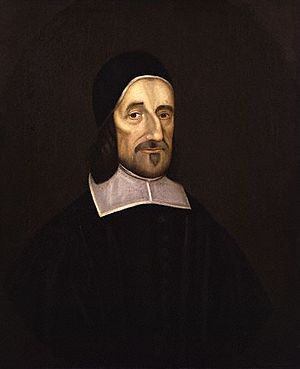
The idea of good order being linked to "godliness" was very strong around 1656, during the time of the Rule of the Major-Generals. At this time, James Berry, a leader of the Independents (another Protestant group), was the government's representative in the region. Berry convinced the local judges to make statements about their intentions. Corbet was one of those who signed an order to close down undesirable alehouses (places that sold alcohol). Richard Baxter, a famous Puritan preacher, spoke at the court sessions that year about how judges should uphold good behavior and stop bad behavior. Corbet was on the judging panel in Shrewsbury on January 8, when six ale sellers were shut down across the county.
However, this strictness didn't last long. Corbet was also present at the next court sessions, where no ale sellers were shut down, and a new license was given to one. This pattern of regulating alehouses was common throughout the century and wasn't just a Puritan idea. In 1640, a jury had already set rules for towns and judges: to reduce the number of places selling alcohol and to enforce rules about weights and measures. There was also concern about drinking on Sundays. Corbet's great-uncle, Richard, had dealt with similar issues in 1596. Punishments for selling ale were mostly for those who broke the licensing laws. Corbet led the judging panel in April 1657, when Bartholomew Poyner was fined for selling ale without a license. Corbet also led the next sessions, when Poyner was brought to court again and faced a public whipping if he didn't pay his fine. Corbet and the other Puritans on the panel were eager to enforce rules but not overly harsh.
Corbet was also effective in using his legal skills to investigate corruption and carelessness in public office. In 1647, Parliament had made rules about neglecting church buildings. In January 1654, Corbet was put in charge of checking the chancel (the part of the church near the altar) at Baschurch and making sure those responsible paid for repairs. He worked on this for over three years until one of the people responsible was fined and threatened with prison if he didn't do the repairs.
In 1657, Corbet was asked to talk to Stephen Hatchet and Thomas Adams, who were former surveyors of Highways at Ellesmere, because they were arguing about their accounts. Being a surveyor was an unpaid job, but it sometimes offered chances for people to get rich. Hatchet had been told to "perfect his accounts" as early as January 1656 and had even been imprisoned for a time. Corbet had to get an order to force them to appear before him. Finally, in January 1659, three years after the case started, the court settled the matter. Corbet was often involved in resolving such disputes, which was an important part of local government during The Protectorate.
Robert Corbet appeared at the court sessions for the last time in Spring 1659. By the next year, the Parliamentarians had been removed from local government, and a new system took over.
Philip Henry, a moderate Puritan preacher, visited Corbet at Stanwardine after the King returned to power in 1660. In 1670, he visited after Corbet's grandson, also named Robert, died. He was welcomed by the Corbets again a year later. In 1672, Henry had a meal at Stanwardine with some old Parliamentarians, which he enjoyed much more.
Member of Parliament
Corbet was one of four members chosen to represent Shropshire in the Parliament of 1654, called the First Protectorate Parliament. This Parliament had only one chamber and was set up under a new set of rules called the Instrument of Government. Members needed to own property worth £200 to qualify. Corbet was joined by Mackworth, Mytton, and Philip Young. Most of the members elected were Presbyterian. Parliament met on September 3. Richard Gough described what happened:
- ..he was once chosen a Knight for the Shire, and served in Parliament, where they gave the Protector twenty-four Acts; he was willing to sign some of them, but not all; but the Parliament had voted that all should be signed or none. The Protector took time to consider until the next day, and then he came to the parliament house with a frowning face, and with many harsh words dissolved them and called them a pack of stubborn knaves.
Parliament and Cromwell had different ideas about what laws to pass. Although they talked about reducing army bases, Cromwell agreed that Shrewsbury was a special case, likely because of the local MPs' efforts. Mackworth died during this Parliament. Corbet is not mentioned in the official records of the House of Commons for this Parliament. The Parliament was dismissed after five lunar months, the shortest time allowed, and no laws were passed.
Marriage and Family Life
Robert Corbet married Elizabeth Ludlow, who was the daughter of Henry Ludlow of Maiden Bradley, Wiltshire. Her brother was Edmund Ludlow.
Robert and Elizabeth Corbet had a son and four daughters who lived longer than them. It seems that three other sons died before them.
- Robert Corbet (died 1636)
- Thomas Corbet married Mary Gerard. He later sold Stanwardine Hall to Sir John Wynn, 5th Baronet, supposedly because of a bet. The family then moved to Worcestershire.
- Letitia Corbet, called "Mrs Lettice" by Gough, likely married.
- Elizabeth Corbet (died 1713) married George Clive.
- Margaret Corbet
- Mary Corbet
- Andrew Corbet (died before his parents)
- Robert Corbet (died before his parents)
Images for kids
 | Dorothy Vaughan |
 | Charles Henry Turner |
 | Hildrus Poindexter |
 | Henry Cecil McBay |


